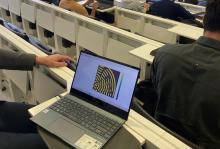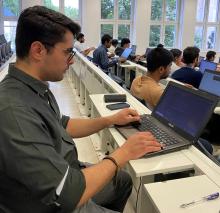We now encounter artificial intelligence time and again in everyday life. And programming with Python has long been a topic in computer science seminars. But it is probably still very rare for AI-assisted programming to be the main topic at a university for an entire semester - this is the assessment of Professor Bernhard Eidel, who currently offers the seminar "Coding with AI" (as part of the "Research Seminar & Journal Club") at TUBAF. And he adds: "It is probably very, very rare to be able to do the whole thing in almost 30 individual projects." A visit to Master's students in Computational Materials Science (CMS) shows what this looks like.
A Tuesday afternoon in the lecture hall of the Julius Weisbach Building. 26 students are sitting behind their laptops and working on their projects. Seminar leader Professor Bernhard Eidel walks through the rows and looks at the progress of each individual, discusses and gives tips. On Muhammad Saad Qureshi's laptop screen, yellow waves can be seen drawing first gentle, then ever larger circles on the dark blue background. The animations show the propagation of waves in elastic bodies. "I created the graphics with Chat GPT4," explains Qureshi. "The presentation also has an aesthetic appeal," says Eidel, "but above all, Mr Qureshi's work has a wide range of applications, for example in the simulation of earthquakes."
"Distrust the code!"
In this seminar, students generate computer codes. These were previously written manually, but are now done by the chatbot GPT4. However, Professor Eidel warned his students at the start of the semester: "Don't trust the code!" It is crucial not to accept the chatbot's performance unquestioningly; the students have to subject the code to a thorough test phase and often add to or correct details. A frequent source of error is that the human has given the machine a task that is not formulated precisely enough or is incomplete. Ashkan Zaheri has taken this very seriously. The student's project deals with modelling and simulating the vibrations of rectangular plates. He compared the results of his project with an existing study. He found less than 1% difference between the calculation of artificial intelligence and that of human intelligence. Zaheri also explains that he gave the chatbot the task of adopting a personality, the so-called persona, right at the beginning: the chatbot should see itself as a programming and engineering expert and have access to the knowledge required for this in particular, which allows it to ignore other data sets that could potentially lead to errors. "And it's now even been proven that it pays to be friendly to this persona in order to get better results," adds Professor Eidel with a laugh.
Cheating with AI?
The relationship between AI and HI, artificial intelligence and human intelligence, as these two competing but at best co-operating cognitive abilities are known, is a field fraught with tension. So-called "AI geniuses" have long since devised extinction scenarios, as the Spiegel recently reported, for example. Professor Eidel also sees dangers alongside the benefits of AI: "Some of the dangers are obvious, for example that our human thinking skills will degenerate the more we leave to AI." In his view, AI is initially a tool that his students should use for programming tasks, as in the seminar, for example to track down a bug or test a code and improve its quality. Eidel also does not consider himself helpless against attempts to use AI to cheat in exams. "Yes, it's certainly an issue in some subjects, especially in seminar papers. Our exams either take place under laboratory conditions, without aids or as an exam interview; that is the moment of truth in any case."
Broadly positioned for professional life
At present, seminars like this are still rather rare at German universities, Professor Eidel assumes. The skills learnt here will rapidly and comprehensively gain importance in professional life, whether in the construction of aircraft or prostheses. His computational materials science students are broadly positioned at the end of their degree programme. Programming is a key qualification, but the subject is not purely computer science. The students work at interfaces with materials science, physics and mechanics, among others. And probably with the necessary critical faculties when it comes to the possibilities and limits of chatbots.

